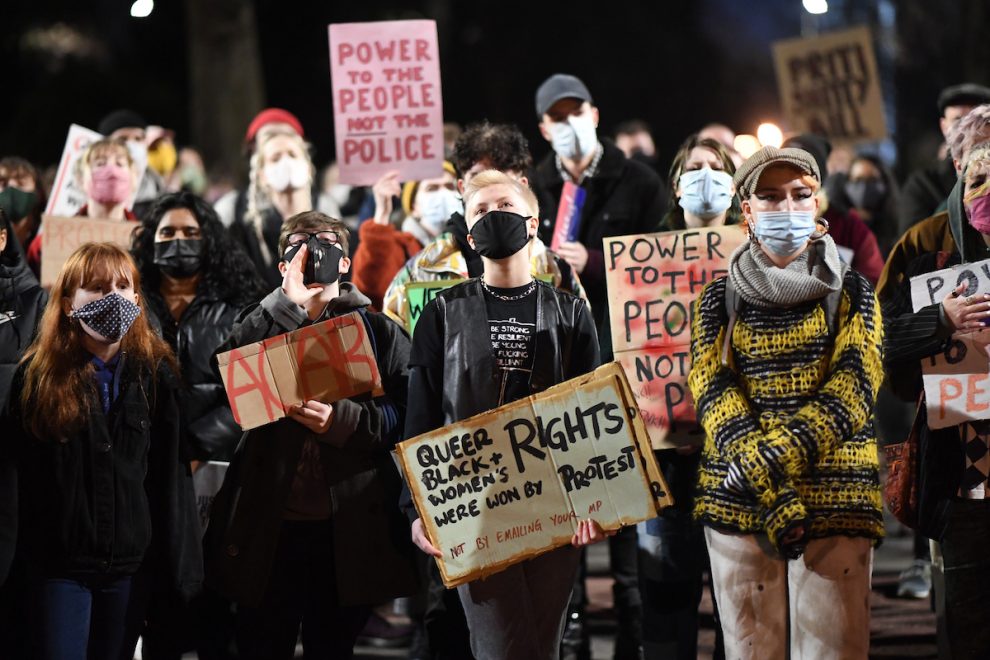This is an opinion piece by award winning Welsh columnist, Matthew Paul. Matthew is the Welsh Media Awards Columnist of the Year 2019
THE PATTERN is becoming familiar.
An outrage of some kind –police brutality against George Floyd, the misbehaviour of Harvey Weinstein or Jeffrey Epstein, and now the abduction and murder of Sarah Everard– becomes the casus belli for another tedious scuffle in the culture wars.
Despite protestations that the #BLM and #MeToo changed everything, they didn’t change much at all.
Slavey statues that became the targets of displaced anger are almost all still there, and it probably remains the case that a young woman looking to further her career in Hollywood won’t find her prospects of success diminished if she appears at gala events on the arm of an ugly old producer.
Whether or not the policeman arrested in connection with Sarah Everard’s death is guilty, it might seem obvious that blame for her murder lies uniquely with whoever it was that killed her.
Although London’s streets are somewhat less safe than usual –because law-abiding people are abiding by the law and staying at home– it would be unfair to lay all the blame either on politicians who imposed the lockdown, or the police who enforce it.
It would seem still less fair to blame the several million male Londoners who were at home on the evening of March 6, rather than out looking for someone to rape, but that hasn’t stopped some people insisting that (exceedingly rare) instances of women being abducted, raped and murdered by men aren’t just the fault of kidnappers, rapists and murderers in particular, but of men in general.
The reasoning behind this mirrors the intellectually iffy #BLM mantras telling people who aren’t racist that, unless they are anti-racists, they are racists. In the same way people who aren’t rapists, unless they are anti-rape, are responsible for rape.
The solution is that every male must make it his duty to educate every other male, until the happy situation is reached in which everyone is anti-rape and rapes simply cease to happen.
There are a couple of problems with this.
In eliminating rape, it’s probably best to start by educating rapists, but many of us will know hardly any rapists. The alternative is to upbraid every male of our acquaintance and tell them – if they were thinking of raping or murdering a woman – not to do so, as it would be likely to lower them in our esteem.
Some men may think the implication that they are only one word of sound advice away from bundling a woman into the back of a truck insulting or offensive.
Of course, anyone who displays this kind of male fragility marks himself out, as a man who needs watching.
While whipping people up into a fury against men, the Labour Party –or at least the halfwits who runs its social media accounts– saw fit to calm women’s concerns about sexual violence in Britain’s streets by tweeting that “rape has been effectively decriminalised” by the Tories.
It is surprising that a party led by a former Director of Public Prosecutions would see fit to endorse a message like this; particularly so as at least three years of the Tories’ rape decriminalisation strategy would have been overseen by Sir Kier Starmer, who was DPP from Cameron’s election until 2013.
If the Tories have been quietly decriminalising rape, it also seems odd that they didn’t do something sooner to stop the police going around arresting former Tory ministers for entirely imaginary rapes.
It is certainly true that rape and sexual assault can be difficult offences to prosecute. In many cases of rape, there will be no other evidence than one person’s word against another’s. False accusations are rare, but a mistaken or lying complainant can still be a credible witness.
Neither judges nor juries are able to distinguish between a truthful witness and one who is credible but wrong. This is the main reason for the disparity between reports of rape and cases which are eventually charged, and there is only so much that prosecutors can do about it.
Since 2003, there have been huge changes in the way that sexual assaults and rapes are investigated and prosecuted. Video recording a rape victim’s first account to the police makes credible complaints easier to put before a jury.
Victims now hardly ever face their alleged attacker directly in court, unless they positively choose to do so. There are strict – and strictly enforced – rules around the content and tone of cross-examination.
Despite all the changes to police practice and to court procedure, rape myths continue to circulate.
These include the suggestion that a woman’s previous sexual history will be fair game in a rape trial (something which hasn’t been the case for more than twenty years), that gloating barristers will wave a complainant’s underwear around in court, or that rape victims will be subject to the ‘digital rape’ of rozzers lasciviously scrolling through every private corner of the camera roll of her mobile phone.
It is these rape myths, rather than any failure of the police or CPS, that create an atmosphere of distrust around the prosecution of sexual offences. Creating a climate of fear that overstates the prevalence of serious violence against women by strangers does nothing to make women safer, or to make rape less likely.
Labour’s decision to politicise Sarah Everard’s death by spreading rape myths shows they put culture wars above women’s safety. This isn’t how a party of government behaves.



















Add Comment